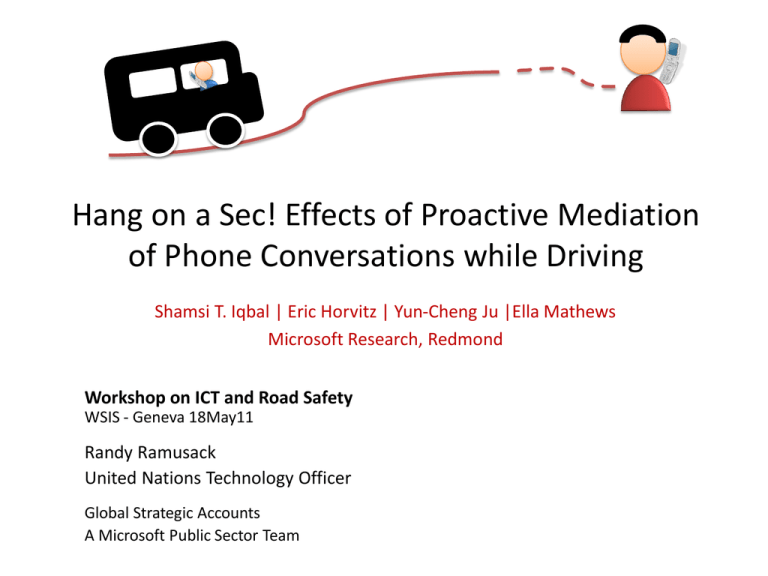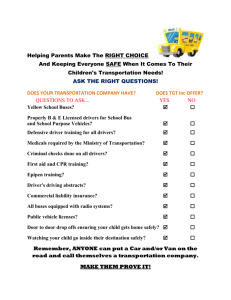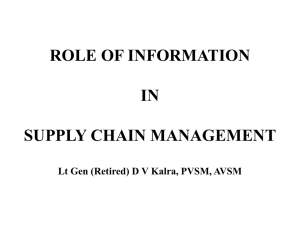Hang on a Sec! Effects of Proactive Mediation
advertisement

Hang on a Sec! Effects of Proactive Mediation of Phone Conversations while Driving Shamsi T. Iqbal | Eric Horvitz | Yun-Cheng Ju |Ella Mathews Microsoft Research, Redmond Workshop on ICT and Road Safety WSIS - Geneva 18May11 Randy Ramusack United Nations Technology Officer Global Strategic Accounts A Microsoft Public Sector Team Driving is no longer a single attention task No calls at all for novice drivers No calls at all for bus drivers Handheld banned for all drivers, handsfree ok 30 states 19 states 8 states No US state bans all use of cell phones while driving Cars of the future adding more multitasking capabilities “But these interactions will be hands-free!” • Demands on cognitive resources are key, not the motor interactions [Strayer and Johnston, 2001] If, When, How • Interleave activities with driving – [Brumby and Salvucci] • Activities may be accommodated during non-complex driving – [Iqbal, Ju and Horvitz] New Direction: Mediation • Core direction for attention management – [McFarlene 2001] – Desktop domain safety critical domain? Can system that knows about driving complexity effectively intervene during conversations so as to enhance safety? How do interventions by a mediator influence • Driving safety • Conversations • Perceptions of participants Study =18 pairs • Medium fidelity driving simulator • Hands free mechanism for phone calls • Caller in separate room Interventions Mode Call on hold? General message Call not on hold Timing Immediate intervention Specific message Call on hold Breakpoint intervention Study Design • 2X2X2 Repeated measures within subjects design 8X2 = 16 trials 2 trials baseline 2 trials 2 trials intervention Methodology • Answer a set of 25 questions for each trial – Information recall questions [Iqbal, Ju and Horvitz CHI 2010] – Caller asks, driver answers, caller records answer • Intervention message before upcoming event – Turns, Construction, Traffic, Pedestrian, Residential area Measures Driving Conversation Collisions # of questions answered Turning Errors Subjective Feedback • Difficulty • Perceived Impact • Preference Results: Impact on Driving Turning Errors /min 81% intervention Effect of Mode0.14 Collisions /min 27% 0.21 74% 0.3 0.25 0.2 0.15 0.1 0.05 0 General Message Specific Message 0.73 0.54 Turning Errors/Min Collisions/min 0.29 0.13 Impact on conversation Number of questions answered/min No hold intervention 0.21 5.9 2.9 7.7 8.36 7.6 Subjective rating: Difficulty Likert scale: 1 (easiest) – 5 (most difficult) intervention 2.21 1.73 1.46 1.39 Perceived Impact 6 Driver Strongly 5 agree Caller 4 Neutral 3 2 Strongly disagree 1 Intervention made driving safer Intervention disrupted the conversation The intervention appeared rude Response count Do we need such a system? 10 9 8 7 6 5 4 3 2 1 0 Driver Caller Never, Not needed Could help Most of the Such a Phone calls drivers can except for in some time such a system should never manage extreme situations system would be allowed driving and driving but not all would be always be during talking on danger helpful helpful driving their own Preferences 1=best, 9=worst Average ranking (1=best, 9=worst) 9 8 Callers Drivers Driver Caller 7 6 5 4 3 2 1 0 No General, BP, General, IM, General, BP, General, IM, Specific, BP, Specific, IM, Specific, BP, Specific, IM, intervention No Hold No hold Hold Hold No hold No Hold Hold Hold Quotes “Prompts to pay attention were really useful, wish I had them in my current system” “Announcement of turns was helpful” “Being put on hold doesn’t help me, makes me wonder what happened…. after using it I seemed to be getting used to the interruptions!” “I really liked the shorter notifications, focus needed is plenty of info” “It was nice to have the detail about the driver focusing, but shorter message is better” “Not sure if I like my behavior being dictated by a computer” “Being put on hold was an annoyance-- but it also gave me a few seconds to collect my thoughts” Summary Interventions with more explicit messages effectively reduce driving errors Traded off with a corresponding slowing down of conversation Drivers prefer interventions more than callers Need to educate on dangers of driving and conversing Feasibility of building intervention systems Questions? shamsi@microsoft.com



